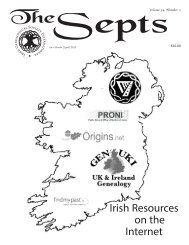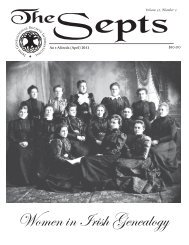(April) 2011 - Irish Genealogical Website International
(April) 2011 - Irish Genealogical Website International
(April) 2011 - Irish Genealogical Website International
Create successful ePaper yourself
Turn your PDF publications into a flip-book with our unique Google optimized e-Paper software.
____________________________________________________________ Christian Brethren Records<br />
The <strong>Irish</strong> Plymouth Brethren<br />
Dwight A. Radford<br />
What is popularly termed the<br />
“Plymouth Brethren” is a movement<br />
that began in Ireland in the 1820s. It moved<br />
to Plymouth, England, among other United<br />
Kingdom cities, and then worldwide. The<br />
Brethren are a conservative evangelical<br />
Christian body that provided the beginning<br />
of a recognizable fundamentalist wing<br />
of evangelical Christianity. In its various<br />
expressions, the Brethren Movement has<br />
influenced evangelical Protestantism. This<br />
article will focus on the Brethren Movement<br />
as expressed by the Plymouth Brethren,<br />
with some reference to the Gospel Hall<br />
movement, which started about 1859. This<br />
article will not include the interrelated<br />
Churches of God (Needed Truth Brethren)<br />
since they date from 1892.<br />
In some areas, the movement appealed to<br />
and grew among the lower middle-class<br />
segment of British and <strong>Irish</strong> society. In<br />
other areas, it appealed to the more skilled<br />
working class. However, the leaders of<br />
the initial movement were drawn almost<br />
exclusively from the upper ranks of that<br />
same society: Anglican clergy, Oxford<br />
dons, lawyers, doctors, the sons of country<br />
families or wealthy merchants.They were all<br />
young men in their twenties or early thirties,<br />
nearly all of them well-educated, and several<br />
of them classical or biblical scholars. The<br />
early Brethren were strongly anti-Catholic.<br />
While they sought to heal the divisions<br />
within Protestantism under the banner of<br />
a restored apostolic Christianity, it was not<br />
through an ecumenical approach.<br />
Technically, “Plymouth Brethren” is a<br />
colloquial term and not the name of any<br />
religious body. Yet, for historical purposes,<br />
the term is used extensively. Today, the<br />
movement is often referred to as Christian<br />
Brethren. The several branches of the<br />
movement are usually classified as “Open<br />
Brethren” and “Exclusive Brethren.” These<br />
terms and the history behind the division<br />
are important to Brethren history and the<br />
<strong>Irish</strong> <strong>Genealogical</strong> Society <strong>International</strong><br />
records generated. In recent years, the<br />
term Exclusive Brethren has been replaced<br />
by some with “non-open Brethren.” This<br />
is to separate themselves from branches of<br />
the Exclusive Brethren, which have taken a<br />
militant and separatist relationship to the<br />
larger world of Brethren.<br />
Today there are more than one million<br />
Plymouth Brethren worldwide in the<br />
various branches. It is not uncommon to<br />
find an ancestor of Protestant background<br />
associating with the Brethren in Ireland.<br />
However, very little has been written from a<br />
genealogical perspective to help identify and<br />
document a Brethren family.<br />
Brethren History<br />
In the early 1800s, many Protestants<br />
felt uncomfortable with all the different<br />
denominations to the point they became<br />
hostile towards the very concept of<br />
denominationalism. Many were anticlerical<br />
and anti-creedal, feeling as though<br />
their churches were compromising biblical<br />
truth for human-created doctrines. These<br />
Christians read their Bibles apart from<br />
the established clergy, beginning at the<br />
New Testament; they sought to restore the<br />
ancient Christianity described in the texts,<br />
which they reasoned was true, pure and<br />
undenominational.<br />
The Brethren movement began in Dublin<br />
about 1827 and spread to Plymouth,<br />
England, in 1831. The earliest Brethren<br />
came from many denominations to meet<br />
together to move beyond sectarianism.<br />
Because the Dublin group referred to<br />
each other as “brother” to avoid titles, they<br />
were nicknamed Brethren. The movement<br />
became so well-known in Plymouth that<br />
the Christians were nicknamed Plymouth<br />
Brethren.<br />
In 1827, John Nelson Darby (1800-82), a<br />
Church of Ireland minister from County<br />
Wicklow, joined the movement. In historical<br />
works, he is often referred to as J.N. Darby<br />
or simply JND and is considered by many<br />
to be the very founder of fundamentalist<br />
evangelical thought. He made a name<br />
for himself as curate of Delgany Parish<br />
in County Wicklow by preaching and<br />
converting hundreds of Roman Catholic<br />
peasants until the Archbishop of Dublin<br />
ruled converts were obliged to swear<br />
allegiance to George IV as the rightful king<br />
of Ireland. JND resigned in protest. He left<br />
the Church of Ireland around 1831.<br />
Between 1827 and 1833,JND’s theology was<br />
formed, although he refined it throughout<br />
his life. He saw the Church of Ireland,<br />
as the state religion, taking advantage of<br />
governmental sanction; that clergymen<br />
limited the concept of a priesthood of all<br />
believers. He believed the church was the<br />
body of Christ, comprised of a heavenly<br />
people. As such, it was not to court earthly<br />
favors. During this time his theological<br />
views on dispensationalism became widely<br />
accepted among the emerging Brethren<br />
movement. By 1831, he joined others<br />
in Plymouth, England, who opposed<br />
denominationalism, one-man ministry and<br />
church formalism. By 1845, the Plymouth<br />
Assembly alone had more than 1,000 people<br />
in their fellowship.<br />
In 1845, a schism occurred within the<br />
Brethren movement over B. W. Newton’s<br />
differing views over the “Secret Rapture,”<br />
Christology, and clericalism. The unity<br />
of the Brethren was compromised again<br />
in 1848, from which time the movement<br />
divided into Open and Exclusive Brethren.<br />
JND remained the dominant voice among<br />
the Exclusive Brethren for another 30 years.<br />
JNDmadefivemissionaryjourneystoNorth<br />
America between 1862 and 1877, working<br />
mostly in New England, Ontario and the<br />
Great Lakes Region. He died in 1882 in<br />
Bournemouth, Dorset, England. From the<br />
1848 division, both Open and non-open<br />
Page 89




